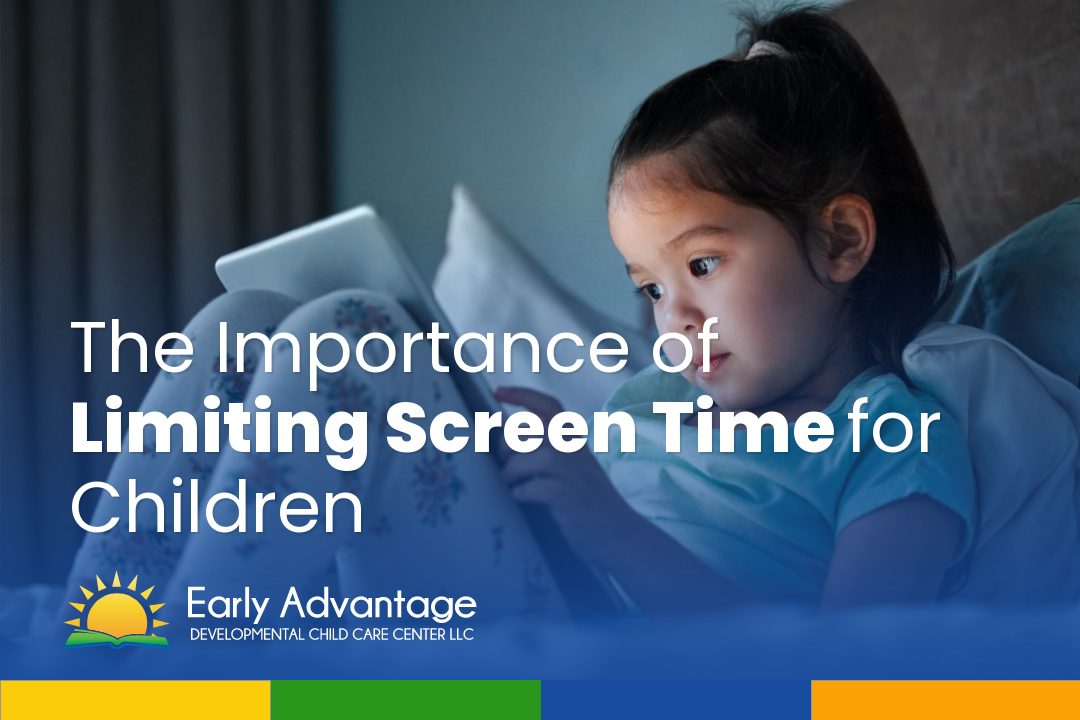In today’s digital age, screens are an integral part of our daily lives. Children are no exception to this trend. From smartphones and tablets to computers and TVs, screens surround kids at home, school, and everywhere in between. While technology does offer various learning and entertainment opportunities, there is growing concern about the potential negative effects of excessive screen time on children’s physical, mental, and emotional well-being. In this article, we’ll explore the significance of limiting screen time for children, why it’s crucial for their development and the practical ways parents can implement limits.
Health Concerns & Limiting Screen Time
Did you know children who spend more time on a screen have been seen to have more health issues than those that don’t? It’s important for parents to know that children who spend more time with a screen see various health issues such as:
- Obesity
- Sleep disturbances
- An increased risk of developing chronic conditions later in life.
- Behavioral problems
- Impaired academic performance
- Difficulty in managing emotions

Influence of Screen Time on Social Skills
While excessive screen time can have a significant impact on a child’s health and social development, it can also limit opportunities for face-to-face interactions with peers and family members. In fact, children who spend significant time in front of screens may have difficulty understanding social cues, expressing emotions, and building meaningful relationships as they grow.
To address this, parents can encourage real-life interactions and communication with others. To do this, consider:
- Organizing playdates
- Participating in group activities
- Engaging in family discussions
These are just a few excellent ways to help children develop empathy, emotional intelligence, and social awareness.
Benefits of Limiting Screen Time
While screens can make any parent’s life easier, limiting time spent on one has its benefits. When choosing to reduce screen time, children are able to engage in more physical activities, social interactions, and imaginative play, all of which are crucial for their cognitive and emotional development. Children may also discover new hobbies, develop creative skills, and improve problem-solving abilities. By limiting screen time, parents can encourage their children to explore the world around them and build meaningful connections with others. It also allows families to spend more quality time together, which plays an integral role in how children look at the world and foster relationships.
Research has also shown children learn best from interacting with their surroundings and engaging in hands-on activities. When parents choose to limit screen time and encourage active learning experiences, they can foster a love for learning in their children.
Effective Ways to Limit Screen Time
If you’re a parent who has made a choice to limit the time using screens, you may find implementing rules and limits for screen time challenging. Rest assured, there are practical strategies you can use to make the transition smoother and help you reduce the amount of screen time for your child or children. Leading by example and limiting your time spent using your own electronic devices is a great option. By choosing to be a good role model, you help your children see you setting healthy boundaries and are more likely to follow suit. Establishing clear rules and setting a schedule for screen use for yourself and for your children can help them to understand and adhere to limits.
Another option is to create a screen-free environment. To do this, consider designating specific rooms or areas in the house for device-free activities. Engaging children in alternative activities like sports, arts and crafts, reading, and outdoor play can also help in diverting their attention from screens and enrich their experiences and their minds.

Positive Screen Time Practices
Not all screen time is harmful, though. Parents can choose high-quality educational content that supports their child’s learning and skill development. Engaging children in interactive games and educational apps can enhance not only their problem-solving abilities but their cognitive skills too. Balancing educational content with age-appropriate entertainment can also make screen time enjoyable while fostering critical thinking and creativity.
Strategies for Reducing Screen Time
For parents looking to reduce screen time, you’ll want to plan carefully and be consistent with implementation. Consider starting by setting specific screen time limits based on age-appropriate recommendations. For instance, you can establish a rule of no screen time during mealtimes or at least an hour before bedtime to promote better sleep. If you’re not sure about what an age-appropriate recommendation is or if you see contradicting information online, consider contacting your pediatrician. They can help to provide guidance from the American Academy of Pediatrics.
Remember, communicating the reasons behind limiting screen time is crucial. When parents involve children in the decision-making process, children not only understand the benefits of reduced screen time, but they are more likely to cooperate and willingly embrace other activities.

Guidelines to Limit a Child’s Screen Time for Children of Different Ages
Every child is different, and with different age groups come unique screen time requirements. Many pediatricians and experts will say children under 2 should not be in front of a screen. While preschoolers should be limited to interactive and educational content, as passive screen time may hinder development. As children get older, screen time can gradually increase, but parents should ensure it doesn’t replace essential activities such as physical exercise and face-to-face interactions with peers and family. As mentioned above, if you have concerns or questions about the adverse effects of too much time on screens or ways you can ensure screen time is limited, contact your pediatrician.
The Key Takeaways
Limiting screen time for children is a topic of utmost importance in today’s digital world. As screens become more pervasive, parents should know the potential risks associated with excessive screen time and take action to protect their children’s well-being. By setting appropriate screen time limits, parents can help their children lead healthier, more active lives, fostering creativity, social skills, and overall development.
Remember, it’s not about completely eliminating screen time; instead, it’s about finding a balance that promotes positive and educational content while allowing ample time for physical activities, social interactions, and other enriching experiences. By being mindful of the impact of screen time on children’s development and taking proactive steps to limit it, parents can create a nurturing environment that supports their child’s growth and happiness.

